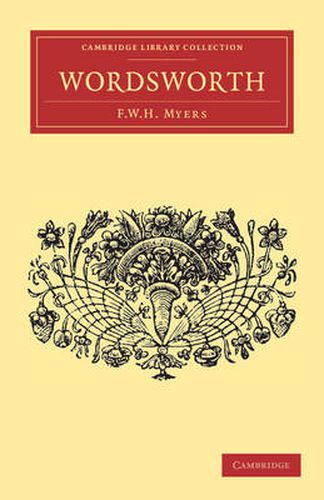Readings Newsletter
Become a Readings Member to make your shopping experience even easier.
Sign in or sign up for free!
You’re not far away from qualifying for FREE standard shipping within Australia
You’ve qualified for FREE standard shipping within Australia
The cart is loading…






The publication in 1798 of Lyrical Ballads, written by William Wordsworth (1770-1850) and Samuel Taylor Coleridge, is considered to have launched the Romantic movement. Published in 1881 in the first series of ‘English Men of Letters’, this biography of Wordsworth by classical scholar and psychical researcher F. W. H. Myers (1843-1901) shows how Wordsworth’s profound imagination and thought characterised and shaped his literary era. He discusses the influence of Wordsworth’s upbringing and love for the natural world on works such as The Excursion, and The Prelude, which are said to have marked the transition from neoclassicism to Romanticism. Showing Wordsworth to be widely respected as ‘so much besides a poet’, Myers describes the circumstances in which Wordsworth accepted the Laureateship in 1843, an apparent surrender to ‘the establishment’ which poets such as Robert Browning regarded as a betrayal of his own earlier radical idealism.
$9.00 standard shipping within Australia
FREE standard shipping within Australia for orders over $100.00
Express & International shipping calculated at checkout
The publication in 1798 of Lyrical Ballads, written by William Wordsworth (1770-1850) and Samuel Taylor Coleridge, is considered to have launched the Romantic movement. Published in 1881 in the first series of ‘English Men of Letters’, this biography of Wordsworth by classical scholar and psychical researcher F. W. H. Myers (1843-1901) shows how Wordsworth’s profound imagination and thought characterised and shaped his literary era. He discusses the influence of Wordsworth’s upbringing and love for the natural world on works such as The Excursion, and The Prelude, which are said to have marked the transition from neoclassicism to Romanticism. Showing Wordsworth to be widely respected as ‘so much besides a poet’, Myers describes the circumstances in which Wordsworth accepted the Laureateship in 1843, an apparent surrender to ‘the establishment’ which poets such as Robert Browning regarded as a betrayal of his own earlier radical idealism.